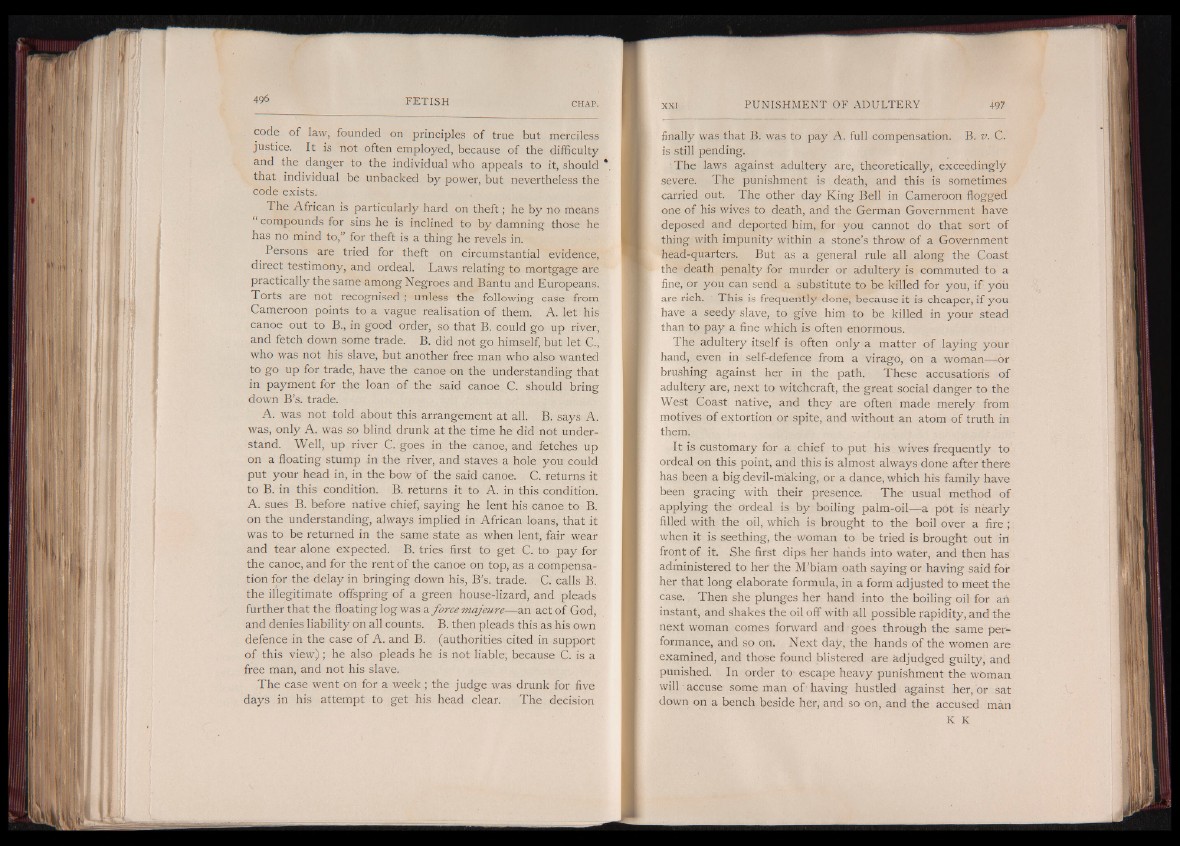
code of law, founded on principles of true but merciless
justice. It is not often employed, because of the difficulty
and the danger to the individual who appeals to it, should *
that individual be unbacked by power, but nevertheless the
code exists.
The African is particularly hard on theft; he by no means
“ compounds for sins he is inclined to by damning those he
has no mind to,” for theft is a thing he revels in.
Persons are tried for theft on circumstantial evidence,
direct testimony, and ordeal. Laws relating to mortgage are
practically the same among Negroes and Bantu and Europeans.
Torts are not recognised ; unless the following case from
Cameroon points to a vague realisation of them. A. let his
canoe out to B., in good order, so that B. could go up river,
and fetch down some trade. B. did not go himself, but let C.,
who was not his slave, but another free man who also wanted
to go up for trade, have the canoe on the understanding that
in payment for the loan of the said canoe C. should bring
down B’s. trade.
A. was not told about this arrangement at all. B. says A.
was, only A. was so blind drunk at the time he did not understand.
Well, up river C. goes in the canoe, and fetches up
on a floating stump in the river, and staves a hole you could
put your head in, in the bow of the said canoe. C. returns it
to B. in this condition. B. returns it to A. in this condition.
A. sues B. before native chief, saying he lent his canoe to B.
on the understanding, always implied in African loans, that it
was to be returned in the same state as when lent, fair wear
and tear alone expected. B. tries first to get C. to pay for
the canoe, and for the rent of the canoe on top, as a compensation
for the delay in bringing down his, B’s. trade. C. calls B.
the illegitimate offspring of a green house-lizard, and pleads
further that the floating log was a force majeure— an act of God,
and denies liability on all counts. B. then pleads this as his own
defence in the case of A. and B. (authorities cited in support
of this view); he also pleads he is not liable, because C. is a
free man, and not his slave.
The case went on for a week ; the judge was drunk for five
days in his attempt to get his head clear. The decision
finally was that B. was to pay A. full compensation. B. v. C.
is still pending.
The laws against adultery are, theoretically, exceedingly
severe. The punishment is death, and this is sometimes
carried out. The other day King Bell in Cameroon flogged
one of his wives to death, and the German Government have
deposed and deported him, for you cannot do that sort of
thing with impunity within a stone’s throw of a Government
head-quarters. But as a general rule all along the Coast
the death penalty for murder or adultery is commuted to a
fine, or you can send a substitute to be killed for you, if you
are rich. This is frequently done, because it is cheaper, if you
have a seedy slave, to give him to be killed in your stead
than to pay a fine which is often enormous.
The adultery itself is often only a matter of laying your
hand, even in self-defence from a virago, on a woman -or
brushing against her in the path. These accusations of
adultery are, next to witchcraft, the great social danger to the
West Coast native, and they are often made merely from
motives of extortion or spite, and without an atom of truth in
them.
It is customary for a chief to put his wives frequently to
ordeal on this point, and this is almost always done after there
has been a big devil-making, or a dance, which his family have
been gracing with their presence. The usual method of
applying the ordeal is by boiling palm-oil— a pot is nearly
filled with the oil, which is brought to the boil over a fire;
when it is seething, the woman to be tried is brought out in
front of it. She first dips her hands into water, and then has
administered to her the M’biam oath saying or having said for
her that long elaborate formula, in a form adjusted to meet the
case. Then she plunges her hand into the boiling oil for an
instant, and shakes the oil off with all possible rapidity, and the
next woman comes forward and goes through the same per-
formance, and so on. Next day, the hands of the women are
examined, and those found blistered are adjudged guilty, and
punished. In order to escape heavy punishment the woman
will accuse some man of having hustled against her, or sat
down on a bench beside her, and so on, and the accused man
K K